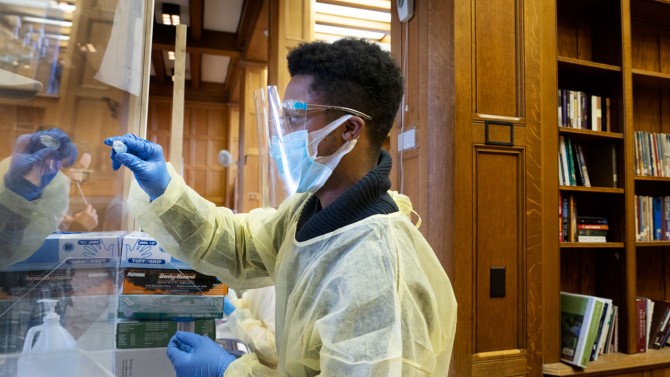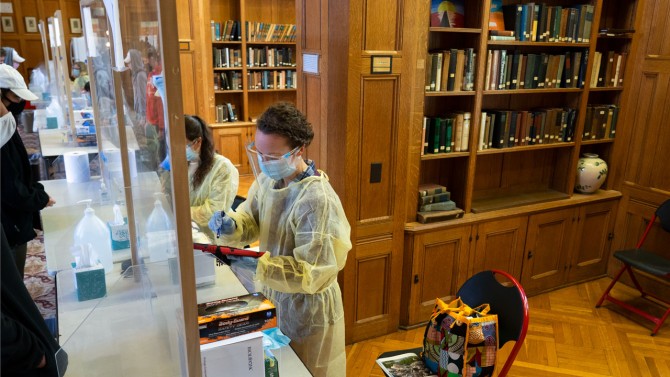When people see success, they often miss the sacrifice, grit, sleepless nights and long hours that made it possible.
At Cornell, committed leaders, expert faculty, trained staff and student hires have worked tirelessly behind the scenes to create a winning strategy to reactivate campus and keep the community safe from COVID-19. Cornell's science-based program to administer 30,000 tests a week in collaboration with Cayuga Health System and return individual results within 24 hours has allowed the university to proactively contact trace and limit disease spread. A campus COVID-19 tracking dashboard reveals a weekly rate of positive infections that hovers barely above 0.01%.
Cornell staff member Ascari Chotoosingh works at one of the stations at the COVID-19 surveillance testing and collection site in Willard Straight Hall.
None of this came easy. Teams of Cornellians have labored around the clock to build an efficient system from scratch - including the Cornell COVID-19 Testing Laboratory (CCTL) where the massive volume of tests are processed.
In early June, Dr. Francois Elvinger, executive director of the College of Veterinary Medicine's Animal Health Diagnostic Center (AHDC), first approached the CCTL's director, Dr. Diego Diel, associate professor in the Department of Population Medicine and director of the virology lab in the AHDC, to ask if he might coordinate efforts to assemble a lab to test the campus community for coronavirus. The task was feasible, given that the AHDC routinely runs high-quality, high-volume tests to detect viruses and pathogens in chickens, cows, horses, deer, fish and many other animals when disease outbreaks occur. Together with the established scientific skills to conduct these tests, the Cornell team developed a strategic partnership with Cayuga Health System (CHS) that allowed the CCTL to be licensed for human testing.
By the beginning of July, Cornell leadership - President Martha E. Pollack; Provost Michael I. Kotlikoff; Gary Koretzky '78, vice provost for academic integration and professor of medicine at Weill Cornell Medicine; and Dr. Lorin Warnick, Ph.D. '94, the Austin O. Hooey Dean of Veterinary Medicine - had given the green light to develop a system to test students, staff and faculty in-house, for quick results that would speed up successful contact tracing and enable a rapid response from health care providers.
"Setting up this lab and being able to have it up and running in 60 days has definitely been one of the biggest challenges of my career," Diel said. "It wouldn't have been possible without the contributions from a lot of people. We really came together as a team and a community."
"CHS was committed to supporting Cornell's campus reopening," said Dr. Martin Stallone, president and CEO of Cayuga Health System. "We were happy to share our roadmap based on the successful testing program that was already underway in Tompkins County."
Objective defined
Understanding where the goalposts stood was an early challenge. Originally, university leaders planned to test all students, faculty and staff on campus once a week, about 3,000 tests a day. However, models developed by Peter Frazier, associate professor of operations research and information engineering, soon showed it was safer to test all undergraduates twice a week, which meant expanding the operation to collect up to 7,000 samples a day.
"The team was so wonderful," said Kim Potter, director of business operations at the AHDC, who was pulled in to the CCTL to oversee the sample collection infrastructure, supply chain management and information technology. "They just said, 'OK, we'll figure it out.' And they did. There were people all across campus that helped, people from the sign shops, guys making plexiglass framework for us on a moment's notice, people deploying that stuff in the middle of the night so that we could be ready the next morning."
"This was not just one person or any one team," Potter said. "This was the Cornell village making this work. I don't think people realize the effort it took to put this together."
Carolyn Chow, human resources recruiter at the College of Veterinary Medicine, and others - including Alida Smith from the veterinary college and Jose Delgado from the Cornell University Library - were brought in to hire enough full- and part-time staff and student employees to meet the check-in, intake and collection needs of eight campus testing sites open seven days a week.
From July through the middle of September, Chow conducted more than 200 interviews. "I basically spent all of July and August doing nothing but interviews," she said.
A swab is placed into a vile at the COVID-19 surveillance testing and collection sites in Willard Straight Hall.
During interviews, Chow searched for people who excelled at customer service to ensure a positive experience for those getting tested, but also to keep the process fast, efficient and accurate.
In the beginning, no one knew how many assistants to hire. Once students began arriving in late August, schedulers were needed to make sure people weren't gathering and standing in line. Chow said support from colleagues, and remembering the goal of moving the university forward, kept her going.
"Every time a major issue came up, I was like, 'No, we've got to do this,'" Chow said. "I don't remember the summer at all."
Once the sampling site teams were staffed, Daniela Mancuso from the Cornell University Hospital for Animals led efforts to organize them.
When Arjun Sweet '22, an Ithaca native, heard that the university was hiring student employees for surveillance testing, he applied and was hired as an intake assistant.
"I thought it was a unique opportunity to give back to both the Cornell and Ithaca communities and try to safeguard [people's] health," he said. "At my stage in life, it's not often that you have the opportunity to be so intimately involved in addressing a public health crisis."
He works six to eight hours a week between classes.
Ascari Chotoosingh, a 2019 Ithaca College graduate, was hired as a full-time intake assistant on a temporary contract, due in part to his customer-service experience working at a pharmacy near his home in New Jersey. He views the experience as valuable for his future, as he plans for a career in health care.
All the intake assistants are protected by two layers of gloves, a disposable gown, a face mask and a face shield. They sit behind a plexiglass screen, and they ask and answer questions and explain the process to those taking the self-administered test. They are trained to sanitize their gloves after each sample is taken, and change them every hour. They also wipe down their stations every hour, or immediately after an appointment if they notice someone coughing or sneezing.
"When somebody comes up to me, I ask how they're doing, how their day is going, and just keep it personable," Chotoosingh said, "but I also make sure that I'm getting them in and out as quickly as possible."
Sweet said he is inspired by the camaraderie and the flexibility of his colleagues, who are working under fluid conditions where the process must accommodate changes. He has also been exposed to a diverse group of people that he wouldn't normally meet as an undergraduate student, he said.
"I've met people who are pursuing business, people who, when [the pandemic] is done, want to open daycares, I've met all sorts of people," he said "It's been a really fantastic work environment to be a part of, I think everyone's been in really good spirits."
Kate Stubenbord, who is the spouse of a Cornell graduate student, works one of the stations at the COVID-19 surveillance testing and collection site in Willard Straight Hall.
Two months in the making
Diel, his staff and facilities crews built the CCTL. Collaborations with Weill Cornell Medicine, Cayuga Health System and Texas A&M University proved instrumental in providing initial COVID-19 samples to validate testing, with that validation happening under the licensure of Cayuga Health System and in coordination with CHS physicians. Researchers from across Cornell's Ithaca campus contacted Diel to volunteer their services, and CHS contributed Health Insurance Portability and Accountability Act-compliant data and scheduling systems, sample collection procedures, and mechanisms for reporting results to state and local public health departments.
"It was about two months of work to get all the validation data and the assays properly evaluated and certified before we could launch the lab," Diel said.
Diel and his team, which included CCTL co-managers Roopa Venugopalan and Melissa Laverack, oversaw assembling the lab, procuring supplies and purchasing equipment, including specialized robotics to handle the large volume of samples. The college's information technology group - led by Scott Ross and Daniel Sheehan - quickly assembled the needed computing infrastructure. And Rahim Rustamov from the Cornell University Hospital for Animals worked to acquire the necessary lab supplies.
"This was not just one person or any one team. This was the Cornell village making this work. I don't think people realize the effort it took to put this together."
Kim Potter
"It has been challenging; the days became a lot longer," said Diel, who like many others still maintains his normal duties - in his case, running AHDC's virology lab and his own research lab.
"We kind of joke on the team," Chow said, "about how we have this job and then we've got our day job."
Venugopalan and Laverack, both staff members in Diel's AHDC virology lab, and Potter's purchasing and acquisition team all faced the task of keeping an inventory of plastic tubes and pipette tips, kits, testing supplies and swabs at a time when labs all over the world also sought the same supplies.
"I would lay awake at 3 o'clock in the morning trying to determine exactly how many tips we were going to need on any given day," Laverack said. "I would calculate that up to seven days a week, you know, 7,000 samples a day for four or five months at a time."
Through established AHDC connections, the CCTL has maintained enough stock to run all the tests without delays.
The lab's 10 members have relied on teamwork. The workflow gets intense at times, but they help each other, Laverack said.
"We watch out for our colleagues all the time," Venugopalan said, noting managers make sure nobody gets overburdened, and jump in to help when needed. "We told the staff, if there's too much going on, just let us know, don't just put it on yourself and don't pass [on] any errors, that's the main thing."
By all accounts, the system is working.
"I'm super proud of what we've done," Laverack said. "I know that we're being watched by the entire country, and I'm really proud to be a part of this."









